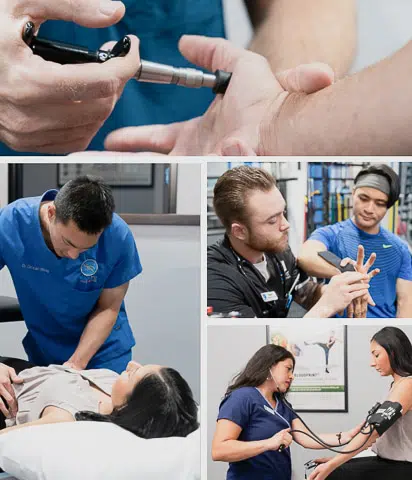Frozen Shoulder

Appointment Inquiries
Call us at: (877) 222-5348
Definition
A shoulder condition characterized by stiffness and pain that limits your range of motion
Root Causes
Decreased Range of Motion, Shoulder Pain, Stiffness
Risk Factors
Cardiovascular Disease, Diabetes, Parkinson's Disease, Shoulder Immboilization, Thyroid Disorders, Tuberculosis
Treatments
Anti-Inflammatory Medication, Joint Injections, Physical Therapy, Prolotherapy
What is a frozen shoulder?
The shoulder joint is a ball and socket joint that connects the humerus (upper arm bone), clavicle (collarbone), and scapula (shoulder blade). Strong connective tissue, called the shoulder capsule, surrounds the joint. Synovial fluid lubricates the shoulder capsule to help your shoulder move easily.
When the shoulder capsule thickens, it can become stiff or tight, and scar tissue may also form between the joint capsule and the head of the humerus. This is called frozen shoulder (also known as adhesive capsulitis).
In most cases of frozen shoulder, there is also a reduction of synovial fluid in the joint. It can mildly or severely limit your range of motion due to pain and stiffness.
Symptoms of frozen shoulder
The telltale sign you have a frozen shoulder is pain when moving your shoulder. You may also have trouble or be unable to move your arm, especially away from your body and up. For some people, the pain can worsen at night, sometimes disrupting sleep.
The pain is usually dull or aching but can be sharp. You might have soreness in your shoulder muscles (deltoids) or upper arm muscles (bicep, tricep, and others).
Symptoms typically begin gradually, worsen over time, and then resolve. There are three stages of frozen shoulder:
Stage 1: Freezing
In the first stage, the pain level will start to increase in your shoulder. As pain increases, the range of motion in your shoulder will decrease. The freezing stage can last between 6 weeks and 9 months.
Stage 2: Frozen
At this stage, the pain may improve but your shoulder will remain stiff or unable to move. Daily activities can become very difficult to accomplish. The frozen stage can last 4 to 6 months.
Stage 3: Thawing
During the final stage, your shoulder motion slowly improves. It may take 6 months to 2 years to partially or fully recover to a normal range of motion and control.
Frozen shoulder is treatable to reduce the length of stages as well as manage pain.
If you have recovered from frozen shoulder but did not regain full range of motion, treatment can also help you get back to normal.
Causes of frozen shoulder
There is no known cause of frozen shoulder. It is known that it can affect the dominant and non-dominant arms equally, and it usually does not recur on the same side. Also, your occupation neither increases nor decreases the risk of developing frozen shoulder.
Risks for frozen shoulder
Frozen shoulder is especially more likely to happen to people that have diabetes or who recently had to immobilize their shoulder for a long period, such as after surgery, arm fracture, rotator cuff injury, or stroke.
Other than diabetes and immobility, women over the age of 40 are more likely to experience frozen shoulder.
These systemic diseases may also increase your risk:
- Cardiovascular disease
- Diabetes
- Overactive thyroid (hyperthyroidism)
- Parkinson’s disease
- Tuberculosis
- Underactive thyroid (hypothyroidism)
Treatment for frozen shoulder
Prevention of frozen shoulder by exercising regularly and treating its risk factors is the best treatment. This is especially important for diabetics and for people after an injury, illness, and surgery.
While frozen shoulder will usually get better on its own over time, it could take 3 years or more to heal on its own. Treatment for frozen shoulder can reduce your recovery time to months. If you’re already in the stages of frozen shoulder or have not fully recovered, a diagnosis is the first step.
At BackFit, our doctors will perform a physical exam to confirm a frozen shoulder diagnosis. X-rays or other imaging tests might also be ordered to rule out other diseases and conditions such as arthritis.
Once we confirm that you have a frozen shoulder, we will put together a custom treatment plan for your affected arm. Physical therapy is core to most frozen shoulder recovery plans. Most frozen shoulder problems can be resolved without the need for invasive arthroscopic surgery.
Our physical therapists will work with you by giving you prescribed exercises. These exercises will help restore range of motion by increasing strength and flexibility in your shoulder. Your treatment plan may also include anti-inflammatories, prolotherapy, natural and steroid joint injections, and more to help return your shoulder movement to normal.
More About BackFit
Looking to learn more? Explore our locations, treatments, or our new patient offer below or contact one of the BackFit Family of staff to have your questions answered.


